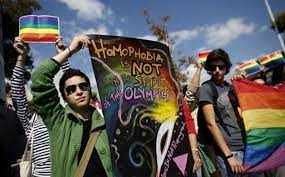Today is May the 17th, and I don’t think I’m alone in saying I didn’t know that today was International Day Against Homophobia, Transphobia and Biphobia, which is a pretty weird concept.
The sentiment is great, don’t get me wrong. Homophobia is still a prevalent issue in society regardless of the “headline” progress we have made. Biphobia within the LGBTQ+ community is rarely spoken about as we hide behind inclusivity without addressing our ignorance.
No matter how you look at it through stats, policies and attitudes, we live in a transphobic society. As 2 in 5 trans people have experienced a hate crime in the last year within the UK. However, and this could be me being cynical. Still, it seems like a marketing ploy made up by the straight masses to seem woke without putting any long term effort into change.
It’s commonplace for pride month to roll around and slap a rainbow on your logo and donate some money to a charity. Thank you, but what else? The fact is, we can only be against discrimination if significant companies and prominent people from all backgrounds are committed to the cause through actions.
Meaning, you can’t say homophobia doesn’t exist because we recognise gay marriage. I have to call bullsh*te there, Karen.

After all, a study by Stonewall discovered that one in five LGBT people have experienced a hate crime or incident due to their sexual orientation and/or gender identity in the last 12 months. That is not only the worst part because no report can accurately show the rate at how LGB people experience causal homophobia which is rooted within the fabric of a heteronormative society.
Casual homophobia’s main objection is to subtly make the person in question feel other or ashamed for their sexual orientation. Regardless of whether the perpetrator knows what they are doing or not.
Casual homophobia comes in many forms, such as slurs used in causal conversation (Apologies, Katie: but you actually can’t run around calling people a f*g because you have gay friends.). This includes the personal favourite of everything playground lunchtime: “That’s so gay!”
Grammatically, it’s just wrong if you’re using the word “gay” as an adjective to describe a person’s demeanour. It’s actually an hilarious misuse of words, because you can actually be calling someone a happy person. Which is painfully ironic.
The term “gay” can stretch to subtle remarks people use as a knee jerk reaction. We have all seen it when someone different comes along, and mainly the older generation makes fun with a limp wrist or laughs. It even bled into the media, and yes, it’s getting better.
Still, the examples are evident when the homosexual man is the butt of the joke and that knee slapper of the lesbian getting confused for a man.
As a person who identifies as part of the LGBTQ+ community, I have to be honest I’m in two conflicting minds about this. One, coming from personal experiences, I’m angry that it still happens, but I’m not surprised.
I’m angry and numb because, like most queer people, I’ve witnessed countless times.
When I casually said I was gay to someone, they laughed in my face. The way people would call me butch with an edge to their voice which made it not okay, being told by straight girls to not look at them I the changing rooms; it’s endless.
The worse is being laughed at for who you are because. It’s not progressive to or inclusive. Although I’m not shocked because it’s a product of being in a world that wasn’t made for me. Heteronormative society was made for a man and woman. Even though we are adapting, that doesn’t mean it’s not the breeding ground for causal homophobia to grow.

I am sad to say the second half of me feels ashamed about causal homophobia, which is wrong, and if anyone else said it, I would prove them wrong.
However, when this happens to me, I’m sad and embarrassed, but I don’t view it on the same level as being assaulted. Which is wrong. I am pretty sure that is a part of the normalised cruel rhyme ‘sticks and stones may break my bones, but names will never hurt me’ lives.
As a child, especially a queer child, we are conditioned to let the hate bounce off us and stand proudly anyway. The real question lies in how can you do that when you don’t admit it affects you?
It is another example of empowering a heteronormative society if you let these actions continue. No matter how subtle they might be, because the impact most certainly isn’t.
Like most people, I’ve experienced this from people I know: which is horrible because the people you love are making fun of something that you are. You don’t want to be a ‘snowflake’ and admit it hurts, but you don’t want to brush it off because it gives them the license to behave that way.
On the other hand, when it’s done in the context of strangers, it’s scary. You can’t decipher if it’s just casual homophobia or if they will turn violent. So, no, the impact isn’t small it is an attack on your character, and I’m not being sensitive by saying that.
So how do we solve this?
Do we wait for all the ignorant all die off or do we just combust the planet and start all over again. Probably not; what we can do is try to change the narrative little by little. People are like sponges, so let’s change what they soak up and replace it by letting people in this position take the mic, and everyone else, let’s plug the speakers in. As causal homophobia, , transphobia, biphobia, and bi-erasure will not stop till we listen and improve.
Featured Image Credit – The Conversation








